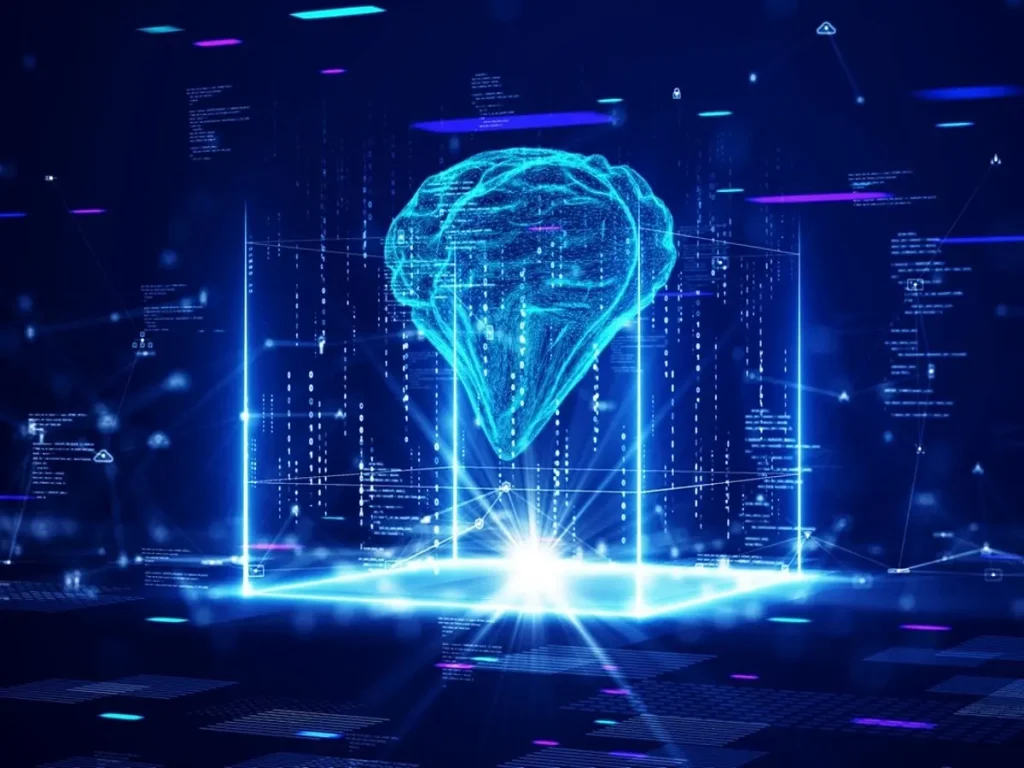Table of Contents
Today’s online scenery has made the world of organizations more vulnerable to cyber attacks, from phishing and ransomware to APTs. Old security controls, while active, prove inadequate in finding new and clever attacks. This is where artificial intelligence in cyber security has arisen as a game-changer.
Through the use of AI-based solutions, companies and directions can improve their size to detect, prevent, and react to cyber fears at higher speeds and levels of accuracy. Artificial intelligence in cyber security is not only a new trend; it is soon going to become a standard tool for caring for sensitive information and keeping digital setups resilient.
What Is Artificial Intelligence in Cyber Security?
Artificial intelligence in cyber security is the application of classy AI technologies like machine learning (ML), natural language processing (NLP), and deep learning to secure digital systems, networks, and information against hateful conduct. While conformist systems depend on set rules, AI-driven security systems can identify patterns, learn from history, and evolve to counter new threats.
For instance, machine learning applications are able to scan huge volumes of network traffic and fix odd patterns that could be indicative of an evolving attack. Likewise, AI-based systems can scan for glitches in user behavior and mark doubtful activity before it becomes an important security incident.
Why Artificial Intelligence in Cyber Security Is Important?
The importance of artificial intelligence in cyber security is that it can process vast amounts of data and reveal masked threats that human analysts may miss. Some of the major reasons AI is crucial in cyber security are:
Speed and Accuracy: AI can process millions of data points in real-time, detecting malicious activity quicker than humans.
Proactive Threat Detection: Rather than waiting for an attack to happen, AI solutions can anticipate possible exposures and block threats before they can cause harm.
Flexibility: Cyber-attacks are changing nonstop, and cyber security artificial intelligence responds to new techniques of attack, providing increased protection.
Cutting Down Human Error: Most cyber-attacks are a result of human error. AI lessens the need for human monitoring and lessens risks.
Also Read
Artificial Intelligence Companies
Applications of Artificial Intelligence in Cyber Security:
The integration of artificial intelligence in cyber security has resulted in ground breaking solutions in various domains. Some of the most powerful applications are listed below:
1. Threat Detection and Prevention:
Systems based on artificial intelligence continuously scan networks and termini for evidence of malware, phishing, or wary activity. Machine learning algorithms can identify patterns indicative of cyber-attacks, enabling governments to prevent them before they cause harm.
2. Fraud Detection:
Financial institutions heavily depend on artificial intelligence in cyber security to identify fake transactions. AI verifies transaction history, consumer spending habits, and user behavior to identify doubtful activities and lower financial fraud.
3. User Authentication:
AI is working to enhance confirmation systems like biometric credit, facial recognition, and social analysis. These functions become more secure while providing streamlined user experiences.
4. Incident Response and Automation:
Artificial intelligence in cyber security improves incident response through automation of dull activities, threat ranking, and immediate insights to the security team. Automation eases the workload for human analysts and also hurries response times.
5. Malware and Ransomware Detection:
AI detects new and unknown types of malware based on their qualities even if they have never met them before. This prevents ransomware attacks from going undetected by traditional antivirus programs.
6. Cloud Security:
Along with the growth of cloud computing, organizations are embracing AI-driven tools to protect cloud infrastructure. Cyber security artificial intelligence identifies misconfigurations, unlawful access, and unusual usage patterns in cloud infrastructures.
7. Security Analytics:
Artificial intelligence systems are capable of collecting and processing data from diverse sources like firewalls, intrusion detection systems, and log files. This helps to gain actionable insights and predict imminent security threats.

Also Read
Types of Artificial Intelligence
Benefits of Artificial Intelligence in Cyber Security:
The use of artificial intelligence in cyber security provides a host of rewards that enhance logistic defense capabilities:
Premature Discovery of Zero-Day Attacks: AI is able to detect zero-day exploits that have not yet been documented, providing organizations with an anticipatory defense mechanism.
Enhanced Efficiency: Through detection and response automation, AI minimizes the time and resources required to manage cyber-attacks.
Cost Savings: AI cyber security reduces expenses of financial losses through data breaches and diminishes the workload for human monitoring.
Scalability: AI solutions are able to grow with the expansion of an organization, safeguarding more sophisticated networks and infrastructures.
Better Accuracy: AI prevents false positives during threat detection, allowing security personnel to target actual issues instead of wasting time on benign alerts.
Challenges of Artificial Intelligence in Cyber Security:
Although it has numerous benefits, artificial intelligence in cyber security also has some challenges:
High Implementation Costs: Applying AI-based solutions is costly andnot easily adopted by small companies.
Data Privacy Concerns: AI is data-hungry, and there are concerns regarding how sensitive data is obtained and stored.
Adversarial Attacks: Criminals can deceive AI systems by providing them with incorrect data, leading to false predictions.
Skill Shortages: Organizations require urbane professionals with the needed skills to deploy and manage AI for cyber security efficiently.
Reliance on Quality Data: The efficiency of AI tools is very much reliant upon the quality and volume of data they have learned on.
The Future of Artificial Intelligence in Cyber Security:
The future of cyber security using artificial intelligence is bright as technology evolves. AI will increasingly contribute to predictive security, allowing organizations to predict attacks before they take place. As quantum computing emerges, cyber-attacks will become even more advanced, and AI will become a necessary component of defense devices.
Additionally, AI will become more fixed in new skills like blockchain, Internet of Things (IoT), and 5G networks to deliver integral security solutions. In the next few years, artificial intelligence in cyber security is expected to shift from being a supporting tool to an integral part of each security structure.
Best Practices for Using Artificial Intelligence in Cyber Security:
To ensure maximum utilization of AI in securing digital systems, organizations should implement the following best practices:
Invest in High-Quality Data: Train AI systems on diverse and accurate data sets to enhance performance.
Integrate AI with Human Expertise: While AI can be used to automate a lot of tasks, human intervention is necessary to validate outputs and make strategic choices.
Update AI Models Regularly: Regularly update AI models to remain in front of changing cyber threats.
Use Strong Data Governance: Protect sensitive data utilized to train AI systems to prevent data breaches.
Practice Multi-Layered Security: Utilize AI as part of an overall strategy that incorporates firewalls, encryption, and human monitoring.
Conclusion:
The advent of cyber-attacks has turned artificial intelligence in cyber security into an essential tool for organizations of all industries. By leveraging the strength of machine learning, deep learning, and automation, AI detects, prevents, and counters cyber-attacks more efficiently than manual practices.
Despite the difficulties ahead, the advantages of AI in safeguarding digital assets outweigh the disadvantages. As cyber attackers keep finding new sophisticated attack techniques, the position of artificial intelligence within cyber security will only become more influential.
FAQs?
What is the Role of Artificial Intelligence in Cyber Security?
What is the Role of Artificial Intelligence in Cyber Security?
Artificial intelligence for cyber security assists in detecting, preventing, and reacting to cyber-attacks at a faster and more precise level through data analysis, pattern detection, and predicting attacks.
How is Artificial Intelligence Transforming Cyber Security?
How is Artificial Intelligence Transforming Cyber Security?
AI is revolutionizing cyber security by making possible proactive threat detection, automated incident response, minimizing human error, and conforming to emerging and evolving cyber threats.
Why Should Businesses Invest in AI for Cyber Security?
Why Should Businesses Invest in AI for Cyber Security?
Companies should invest in AI for cyber security since it enhances digital resilience, minimizes breach costs, increases efficiency, and provides better digital defense against sophisticated attacks.

